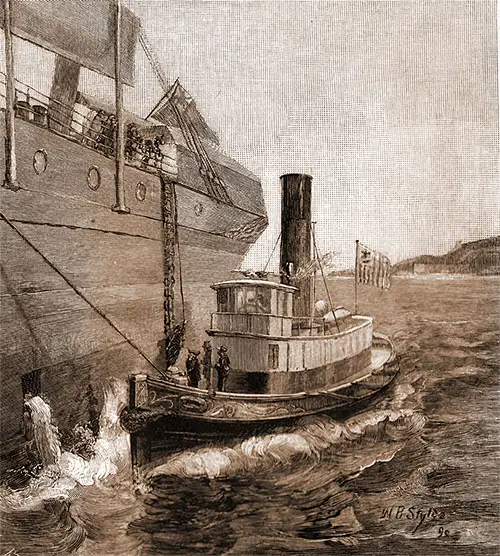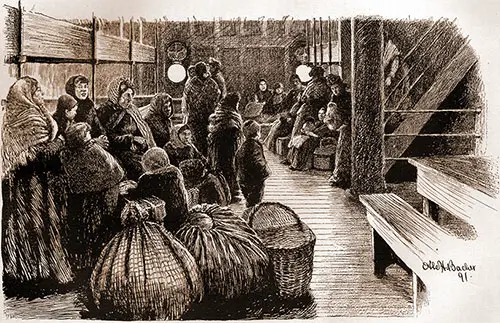Procedures for processing Immigrants onboard Steamships - Ocean Passenger Travel
All incoming steamers are signaled off Fire Island or Sandy Hook, their arrival is telegraphed to the Quarantine station and the ship-news office, and in about three hours the vessel reaches Quarantine from Fire Island, or about one hour from Sandy Hook.

A Revenue Officer Boards a ship in New York Bay
At Quarantine the health officer boards her, and if it is found that she has no case of contagious disease on board she is permitted to proceed to her dock, which she reaches in about one hour and a half, including the time of examination by the health officer; but if she has any serious case on board she is detained at Quarantine until she receives orders from the health officer to land her passengers.
As soon as the vessel is reported inside Sandy Hook the revenue cutter starts down the bay to meet her, with the customs officers on board. The boarding officer places several staff officers on board, who go immediately to the saloon, where declarations are made and signed by the saloon passengers as to the contents of their trunks, etc., and all baggage is searched on arrival of the vessel at her dock, when those who attempt " monkeying " with the customs officials will find out that the little trick does not pay.
Meantime, how do the folk get on ?
Mention has been made of the British governmental bill of fare. This was instituted when clipper ships were in. vogue. It was ordered that a minimum weekly allowance of raw food should be provided for every adult third-class passenger as follows :
3 1/2 pounds bread, or biscuit, not inferior in quality to navy biscuit; 1 pound flour; 1 1/2 pound oatmeal; 1 1/2 pound rice; 14 pound peas; 1 1/4 pound beef; 1 pound pork; 2 pounds potatoes; 2 ounces tea; 1 pound sugar; ounce mustard; I ounce ground black pepper; 2 ounces salt; 1 gill vinegar.
A government inspector saw to it that these items or their equivalents were provided upon the departure of every ship carrying third-class passengers, and that no ship went to sea without being provisioned for thirty days. The allowance, however, proved not to be altogether generous, and many passengers brought stores of their own along.
In any event, each passenger had to prepare his own meals at the cook's galley, for the number of cooks furnished was always insufficient. The kitchen is never commodious at the best, aboard ship, and it needs no imagination to picture the struggle of immigrants, one against another, for a turn at the fire.
The government requisition is still in force, but it is substantially a dead letter, for not only the British but all European steamship companies now provide ample fare for all passengers.

Passenger in on a steamship circa 1890
A young man who crossed in the last year described his fare to the writer, thus : " At breakfast," he said, " we usually had oatmeal porridge and molasses, with coffee in plenty, rolls and butter.
This was varied by bash instead of porridge on some days, or perhaps an Irish stew; but fresh baked rolls and butter were always in abundance.
There was always soup at dinner, and some boiled beef, pork, or fish, with potatoes and bread. Supper did not amount to much, but there was plenty of plain, good stuff to eat. Roast beef and plum duff were served at Sunday's dinner."
This food was served to the passengers by stewards, but there was no placing of dishes opposite the passenger's plate. The general meal was set down in the middle of the table, and "help yourself " was the order of the day.
The passengers do not cook their own food now, but they have to provide their own cups, plates, and other utensils, as well as their own bedding.
All captains of passenger steamships are scrupulously attentive to the needs of their passengers. Not a day passes that they do not make a personal inspection of this department, and they are always approachable in the event of complaints arising on the part of the poorest travelers.
It is related of one old-time Commander— Captain John Mirehouse—that in order to assure himself of the proper quality and preparation of the food, he invariably had his lunch served from the galley at the dinner hour; and he used to declare that his lunches were as wholesome and palatable as he could desire.
Ocean Passenger Travel - 1891
- Chapter 1: Overview of Transatlantic Travel
- Chapter 2: Room on the Early Steamers
- Chapter 3: The Collins Line, The Inman Company, Beginnings of the White Star Line
- Chapter 4: The Speed of the 1890 Steamships
- Chapter 5: Transatlantic Passengers and the Buildup of Fleets
- Chapter 6: Provisions and Meals on an 1890s Ocean Liner
- Chapter 7: Procedures for processing Immigrants onboard Steamships
- Chapter 8: The Importance of the Immigrant Trade
